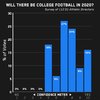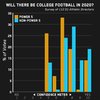From Wilner's free newsletter today. Nothing definitive, but it won't be that long before we know.
You can
sign up here to receive it directly.
Larry Scott on the State of Pac-12 football
Pac-12 officials have spent several weeks sorting through issues of immediate import during the COVID-19 shutdown, from the welfare of student-athletes scattered across the country to the financial damage incurred by the NCAA Tournament cancellation to the extension of eligibility for spring sports athletes.
But soon, very soon, the focus will turn to those dark skies looming on the September horizon.
“In the next week or two,’’ according to commissioner Larry Scott, the conference will dive into the potential for a disrupted football season.
“The optimistic model has an elongated training camp and on-time start (to the season),’’ Scott said. “The most pessimistic has no season at all.”
If the season starts on time, when would teams need to commence training camp in order to ensure the players are in proper physical condition?
If the season is delayed or canceled, how would the logistical and financial ramifications play out?
The Pac-12 has already formed what Scott described as a “football planning committee” that includes athletic directors, head coaches and directors of football operations and was asked to “identify and navigate the short-term issues.”
Now that the conference has suspended all organized team activities through May 31, the focus will broaden in scope.
Scott identified the end of May as an approximate deadline for determining the direction of the preseason and regular season.
And that direction, he indicated, will come from outside the Pac-12 football circle.
“A lot has to do with what the universities decide for their students on campus and what the public health officials believe,’’ Scott said, noting that schools have gone to remote learning.
“The decision is not really in our control.”
If there is disruption, the financial implications could be immense.
Football accounts for the vast majority of annual revenue for major college athletic departments: Each home game generates several million dollars in ticket revenue, and the TV contracts — both for the regular season and major bowls — are worth in excess of $20 million per school per year.
How would conferences be compensated for canceled games?
How would the TV windows be reconfigured if the season gets delayed or interrupted?
“I have been on the phone with ESPN and Fox, and whenever I get on the phone with them, they’re getting off the phone with representatives from the NBA and the NFL and baseball and NASCAR,’’ Scott said.
“By the time we see an impact on football, our (TV) partners will have figured out how to adapt an abbreviated season with what they’re doing with the NBA and the NFL and baseball and NASCAR.
“There’s a long-term view; people want to be fair. There will be an industry approach." -- Jon Wilner

www.npr.org


